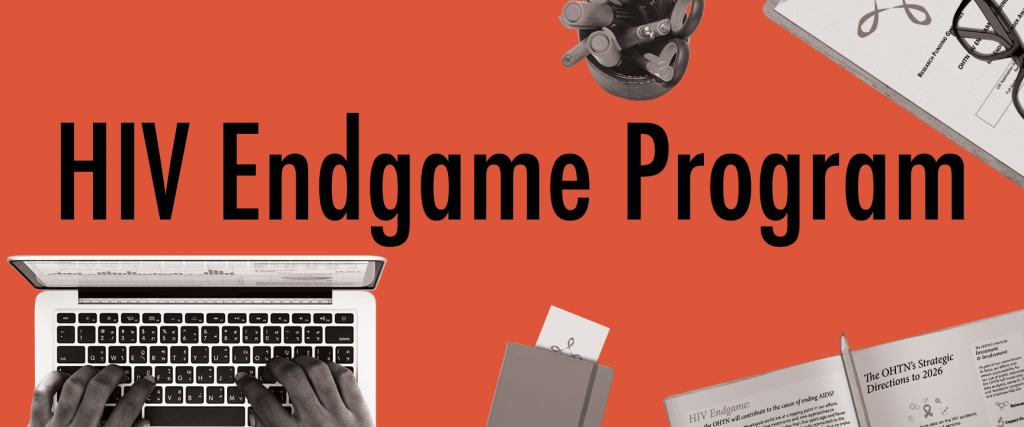These are the results of the Fall 2020-2021 HIV Endgame Funding Program.
- The results of the 2021-2022 competition can be viewed here.
- The results of the Spring 2020-2021 competition can be viewed here.
- The results of the 2019-2020 competition can be viewed here.
- The results of the 2018-2019 competition can be viewed here.
This funding program supports people and projects that have the potential to:
- meet the needs of populations in Ontario most affected by HIV
- drive changes in policy and practice across the HIV prevention, engagement, and care cascade
- lead to more integrated health and social services
- identify effective ways to address the social determinants that have a negative impact on the health of communities most affected by HIV
- contribute to a rapid learning HIV health and social system
1. Breaking New Ground
David Brennan, Professor at the Factor-Inwentash Faculty of Social Work, University of Toronto
Examining Gay and Bisexual Men’s Acceptability of, and Experiences with, HIV Treatment as Prevention Strategies and the “U=U” Campaign
This project will examine Undetectable = Untransmittable (U=U) messaging knowledge among diverse and racialized gay, bisexual, Two-spirit, and other men who have sex with men (GB2SM), including Indigenous and Two-Spirit and African, Caribbean and Black GB2SM. The project team will explore: awareness and knowledge of U=U; confidence in the effectiveness of U=U; and willingness to consider viral load suppression in sexual decision-making. They will also examine knowledge of and willingness to promote U=U as an HIV prevention strategy among frontline healthcare workers. Results from this study will facilitate greater uptake of U=U messaging and encourage access to more relevant and culturally responsive healthcare service for GB2SM.
This project involves collaboration with the Community-Based Research Centre (CBRC), Gay Men’s Sexual Health Alliance (GMSH), Prevention Access Campaign, Black Coalition for AIDS Prevention (Black CAP), Centre for Spanish Speaking Peoples (CSSP), and 2-Spirited People of the 1st Nations.
Tim Guimond, Clinician-Researcher at the Centre for Addiction and Mental Health
Developing an Innovative Approach to Treating Methamphetamine Use Disorder among Gay, Bisexual and Other Men Who Have Sex with Men
Based at HQ – a health hub that will offer integrated mental health, sexual health and social/spiritual health services for cis men and trans people into guys – and delivered by HQ staff and partners, this project aims to develop a new therapy intervention for gay, bisexual, and other men who have sex with men (GBMSM) who use methamphetamine in Ontario. The intervention will draw from current best practices that integrate various therapeutic modalities and find a way to measure outcomes that reflect both harm reduction and abstinence goals. This project will model an intervention development process that draws on the expertise of both people with lived experience and the frontline service providers who will deliver this type of intervention. Within the GBMSM community, this will help to expand treatment options and increase the capacity of partner organizations to deliver treatments for methamphetamine.
This project involves collaboration with ACT, the University of Toronto, and the Black Coalition for AIDS Prevention (Black CAP).
2. Community-Based Project
Lindsay Windhager, Harm Reduction Coordinator at Regent Park Community Health Centre
Harm Reduction Programming and HIV Prevention for Women, Trans and Non-Binary People who Use Drugs: Co-Creating Gender-Responsive, Sustainable Programming in the Context of Dual Public Health Emergencies
This project aims to enhance the capacity of women, trans, and non-binary people who use drugs (WTNB-PWUD) and service providers at community health centres and AIDS service organizations to meaningfully participate in the co-creation of gender-responsive harm reduction and HIV prevention programming. The project team will evaluate a unique gender-responsive supervised injection service (SIS) as well as mainstream SIS explore what service design elements are successful or could be improved to better address harm reduction, HIV prevention, and HIV treatment needs. From this evaluation, the team will develop a new model of gender-responsive harm reduction programming to address the HIV prevention cascade as well as overdose and other drug-related harms. This project aims to better understand the lived realties of WTNB-PWUD and to make harm reduction and HIV service models more accessible.
This project involves collaboration with the University of Toronto, University of Windsor, Canadian Association of People Who Use Drugs (CAPUD), and the Canadian AIDS Treatment Information Exchange (CATIE).
